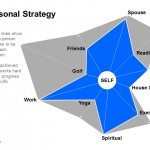Most of us seek in our professional affiliation what some call a state of flow or what others call happiness, exhilaration, satisfaction, or leading a fulfilled life. Along these lines see: Flow: The Psychology of Optimal Experience by Mihaly Csikszentmihalyi and The Doom Loop System by my long time personal executive coach Dr. Dory Hollander who passed away last year and who also told me and others that the secret to a fulfilled life could be summarized in just four words (which are shared inthe last words of this post!).
Job satisfaction, however, may, in the end, not be something you can pursue for its own sake. It may, rather, be something that comes about as a by-product when you try hard to accomplish something. The best moments occur when body and / or mind are stretched to the limit in a voluntary effort to accomplish something difficult and worthwhile.
When in a state of such exertion and accomplishment, there is a sense of pride and fulfillment that is both pleasurable and addictive. Some who experience flow when climbing mountains scale a peak only to start preparing to climb the next even before leaving the summit and are doomed to repeat the experience over and over in a never-ending quest to bag the ultimate peak.
Many find something similar in their work lives when they lose themselves in a strong-minded pursuit of one single, all-consuming work goal after another, much like the mountain climber in search of the perfect peak.
While the career-minded person and the mountain climber may accomplish a great deal, their one dimension of focus might really be a copout. They have made life’s most important decision, how to spend time, too simple. That is, whenever there are trade offs between spending time in their area of focus and spending time on other things, the all-important quest compels them to always defer to their main line of pursuit.
The downside is that their success and fulfillment likely comes at great expense to family, friends, and ultimately also to themselves. Work and work goals are important but only as one dimension of a life. Those who climb mountains always look forward to the next climb but can also have goals and aspirations in other areas including family, school, social, sports, and so on.
On their death beds, some who accomplished a great deal in life, but had shallow lives outside of work, reveal that every step of the way they always did what they thought they had no choice but to do or what they truly believed was right to do. Only after it was too late did they realize they could have chosen to spend time in other areas of life and been happier (see: Gordon Livingtston’s: Too Soon Old, Too Late Smart: Thirty True Things You Need to Know Now)
A more enlightened approach is to view work and work goals as important, but only as one dimension of a multifaceted life. Those who climb mountains, for example, might always look forward to the next climb but also have goals and aspirations along other lines including family, school, civic, social, sports, and so on.
A way to think about it is in the form of a spider diagram, or Life Wheel, where a person is seen to manage an ever evolving portfolio of pursuits throughout their life. They set milestones and goals in each line of pursuit and monitor progress. At any time they have consciously decided which of these are of top importance and so get the majority of time and attention. When the time is right, they switch emphasis to another.
The “quality of the journey” across the portfolio of pursuits, is then revealed by the pattern of progress, actualization and recollection along all lines of pursuit — not just by how well things are going at work or on the mountain trail.
To pull this off, for each line of pursuit it helps to:
- Have a specific, hard-to-reach but achievable goal
- Work hard to reach the goal
- Know what to watch to know where you are in terms of reaching it
- Know you have, or will get, the skills and resources to be successful
- Enjoy it so much that you lose track of time in its pursuit
- Act intentionally on a chosen dimension to achieve a specific next stage of development
- Focus on just one or two or three at any point in time because it is hard to make much progress on more than one or two pursuits at a time and pursuing many paths at the same time results in thrashing and in being busy, but with little progress
- Concentrate on one or two or three for a specific period and then switch to another one or two at another time as feels appropriate. E.g., in your mid-20s to late 30s you may focus on career and family then, in your 50s and 60s, work on travel, health and handicap.
To sum it up in four words, the secret to a happy and fulfilled life is to: Act Intentionally … Persist Variously!



